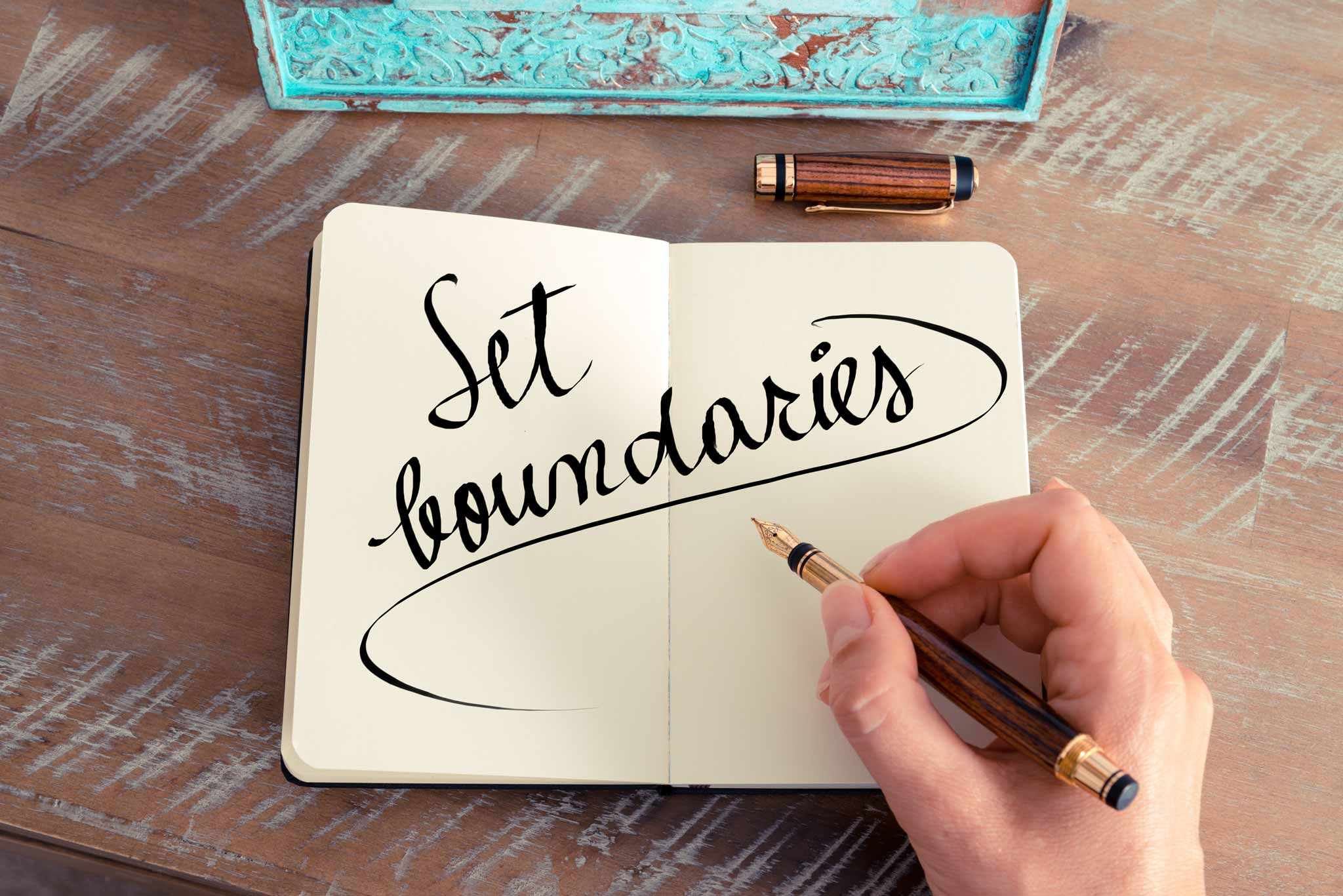Establishing boundaries is among the best practices for those who care for or live with someone going through addiction recovery. Boundaries also help your mental health. Setting boundaries doesn’t mean building walls. Healthy boundaries not only support your addicted loved one, but they also help you be one of the only steady things in that person’s life. Setting boundaries with someone struggling with addiction can be the easier part, but maintaining healthy boundaries becomes more challenging while being critically important.
How Do I Start Setting Healthy Boundaries?
Even in healthy relationships, we need to set personal boundaries, much less when facing a drug or alcohol addiction. A healthy boundary simply means behavior that will or will not be tolerated. It could be anything from requiring a teenager to be home by 10:00 pm or refusing to let your partner text their ex.
Your boundaries should reflect your beliefs and values while still respecting the other individual. Healthy boundaries can be agreed upon or deal breakers in relationships. Having a good sense of healthy boundaries in life will help when the stakes are much higher with an addicted person in your life.
Related: How To Set Boundaries In A Relationship
What Are Healthy Boundaries?
Establishing boundaries with someone who struggles with addiction could actually be a life-saving tactic. You draw the line in the sand of what behavior won’t be tolerated while still helping the individual on the path to recovery. It’s worth noting that sometimes setting boundaries will make things worse before they get better. This is only because you are teaching a person a new way of acceptable behavior.
You have to choose which boundaries are non-negotiable, and you have to hold yourself accountable. Create a support system, including your own friends and loved ones, to give you support. At the beginning of the journey, you have to decide what will and won’t be tolerated. You have to remove any excuses someone suffering from alcohol or drug addiction might give and be able to stand your ground.
Setting healthy boundaries might include:
Healthy financial boundaries can be established to prevent direct enablement of someone’s addiction. A financial boundary may look like refusing to loan or give money to someone, no matter how desperate they are. Every situation is different, however, if you set a financial boundary you must keep it in place. Helping someone with a recurring payment for example, could set a precedent that the boundary doesn’t mean much.
Boundaries surrounding abusive behavior are lines drawn in the sand that indicate a zero tolerance policy for emotional and physical abuse. This includes idle threats and mind games. If someone is to violate this boundary, the consequences should be determined beforehand, whether it’s to vacate the home or take away certain privileges.
A healthy boundary based on addictive substances may seem simple, but in reality, it is important to be very clear when it comes to what this looks like for you, your home, and your family. It can start with absolutely no drugs or paraphernalia allowed on the property. Beyond that, it can be beneficial to go a step further and forbid someone from being actively under the influence on the property.
If someone breaks the law and ends up in jail or in trouble with the law as a result of decisions they made while in active addiction, a healthy boundary here would be to not bail them out or pay for legal counsel. This can be a difficult boundary to uphold due to fear of someone staying in jail for a long time or going to prison, however, the only way for people to learn from their mistakes is to deal with the consequences on their own.
At times, families of individuals want to rush to the rescue and make excuses or lie on behalf of their loved ones to save face. This may seem like a form of protection but it’s actually enabling their behavior. Making an excuse for them or lying is preventing them from understanding the true repercussions of their actions. If you’re always saving the day, they will never learn from their mistakes, and the destructive behavior will continue.
Communicate Your Own Boundaries
Boundaries can’t just be an inside secret. You must clearly spell out the boundaries and repeat them as often as necessary. Write them down and give them to the person dealing with addiction. It’s natural for anyone to push back against boundaries, to “test them.” This is evident by how many people have actually touched a hot stove, simply out of curiosity.
Even if the person you set boundaries against goes off the handle or cries when you set the boundaries, listing off various “buts,” stay firm. You do not have to fill the air with more conversation once you have set the boundaries. If you do, simply repeat, “I love you, and this is how it’s going to be.”

Is Setting Boundaries Part of Family Therapy?
Setting smart boundaries can go hand-in-hand with family therapy, but those boundaries are set above and beyond any counseling session or noted improvement during the healing process. Therapy is also a good time to discuss the challenges or violations of the boundaries since the previous session.
Professional substance abuse treatment will also help a loved one learn boundaries that might not be so obvious. For example, if a loved one is dealing with drug addiction, they might seek out different personal items in your home to get a buzz. You might not even realize the computer keyboard cleaner or mouthwash could be a triggering mechanism.
Can Boundaries Be Unhealthy?
Yes, it’s generally unhealthy boundaries and impulse control that fed the addiction in the first place. Health and unhealthy boundaries can be blurred, especially if you are in a co-dependent relationship or are an empathetic person. Signs you are at or beyond an unhealthy boundary include the following phases:
“Just one more time.”
“If you loved me, you would…”
“If you don’t do this, I’m going to use again.”
“I’m better, I promise. Just let me…”
“You’ll never see me again if you don’t…”
Unhealthy boundaries prey on guilt, love, and fear. Addictive substances don’t make people bad, but they can make them do really bad things; manipulation is a hallmark of addiction. Our loved ones have a monster inside that is preying on the part of their personality that knows the loved one well. They know if an annoyance, guilt, or threat will get someone to cave in.
Remember, you are battling the demon inside, not the person you love, when you stand by your boundaries.

What If I Mess Up the Boundaries?
Allow yourself grace. It’s not easy to handle the variables that come with addiction. Our emotional state and mental capacity for stress can impact the decisions we make when we’re facing a dangerous or concerning situation. Here are some ways to help stay away from weak boundaries:
If you’re having trouble sticking to your boundaries, starting the day with repeated affirmations can prepare you for the moment when you need to stand your ground. It can be something like, “Today I am strong. I forgive myself for my weakness. I will stand by my boundaries.”
When someone you care about is struggling with addiction and the recovery process, it can be challenging to get through the day without some form of manipulation or chaos. Writing down how you feel and keeping a journal can help establish a baseline of progress or regression with your boundaries.
If you continue to live with someone struggling with addiction, it can be extremely difficult to find time for yourself. They may need something constantly or cause a lot of stress from day to day. Creating some space for yourself can ease the pressure you feel and reinforce your headspace to be prepared when the time comes to enforce a boundary.
What If Other Family Members Don’t Agree with My Boundaries?
In an ideal situation, all family members and loved ones form a united front of what constitutes acceptable behavior. Nothing about dealing with an addicted individual is ideal. You can only speak about the boundaries you set between you and the person you love. You cannot control other people, but you can clearly explain why your boundaries are potentially life-saving rules.
Never belittle someone who was at an emotional limit and violated a boundary. The family unit in the life of someone struggling with substance use disorder deals with its own struggles, and supporting each other is crucial.
How Do I Set Personal Boundaries With a Teenager?
When it comes to a child, you not only have a maternal or paternal urge to help, you have a legal responsibility to do so. Healthy boundaries with a teenager can involve if they have access to the internet or social media, when they can use devices, and where they can go when they leave the house.
In some states, parents can be charged for their child’s crimes. You not only need boundaries to save your child’s life, but you also need them so you can continue to be a person capable of providing the much-needed help.
Does Setting Boundaries Always Work?
Unfortunately, some people will push back against boundaries and refuse to adapt to the rules and consequences. Sometimes loved ones struggle with keeping healthy boundaries strong. Learning about setting health boundaries with someone struggling with addiction is an essential step when it comes to healing from the damage of addiction on a family and relationship level.
Enforcing Boundaries in Addiction Treatment
The team at Clear Behavioral Health brings compassionate care with a proven practice of breaking the addiction cycle. Our practitioners bring grace with healthy boundaries during one of the most challenging parts of the recovery process and through professional treatment. If you or someone you know is struggling with addiction, call us to learn more about our addiction treatment programs including medical detox and rehab like alcohol detox and drug detox and dual diagnosis outpatient programs. We are available 24/7 and a member of our care team would love to guide you towards the best treatment option for you.
